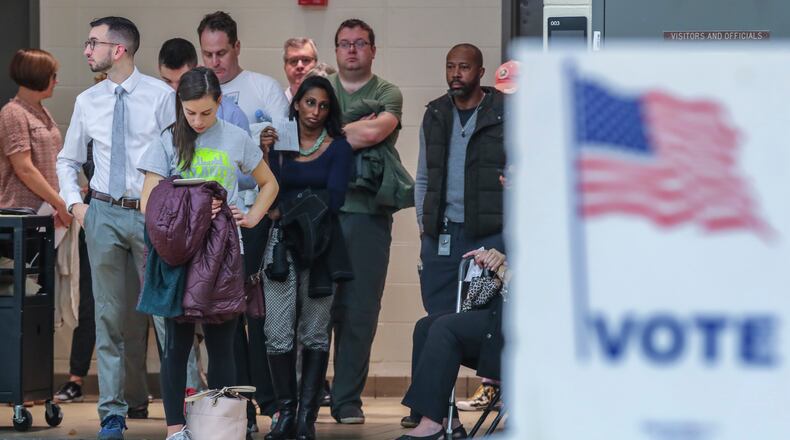A federal judge has dismissed a lawsuit alleging that metro Atlanta's four largest counties failed to provide enough polling places, voting machines and staff during the 2018 election, resulting in lines longer than three hours in some precincts.
U.S. District Judge Amy Totenberg ruled Wednesday that the plaintiffs, an organization called Georgia Shift and several voters, didn’t show how the court should intervene beyond ordering election officials to comply with the law.
“This court does not sit as a guarantor of a flawless election,” Totenberg wrote. “The court is sensitive to and concerned with the potential for voter disenfranchisement that was felt in 2018. However, plaintiffs’ allegations fail to concretely establish how the court can effectively redress the asserted injuries.”
Totenberg wrote that if county election officials can’t carry out their duties in this year’s elections, the plaintiffs could file another lawsuit on behalf of affected voters.
The lawsuit, filed in March, sought to hold Cobb, DeKalb, Fulton and Gwinnett counties responsible for problems facing voters during the high-turnout election for governor between Republican Brian Kemp and Democrat Stacey Abrams.
Long lines greeted many voters on Election Day, causing some voters to leave their polling places without casting ballots. Voters also faced delays in Gwinnett because voter check-in computers weren't working. In one polling place, those computers ran out of batteries because power cords weren't packed.
The lawsuit also sought relief because Gwinnett election officials rejected a disproportionate number of absentee ballots compared with the rest of the state.
An attorney for Cobb County said the ruling recognized that the plaintiffs lacked standing to bring the lawsuit. Election officials and attorneys from DeKalb, Fulton and Gwinnett counties didn’t comment.
“The court agreed with the county defendants that the alleged injury was speculative. It wasn’t immediate and concrete,” said Elizabeth Monyak, senior associate county attorney for Cobb.
But Totenberg’s ruling serves as a “warning shot” ahead of this year’s elections, said Sean Young, the legal director for the American Civil Liberties Union of Georgia, which represented Georgia Shift in the lawsuit.
Local election officials must be prepared to accommodate all voters during the March 24 presidential primary and the Nov. 3 general election, Young said.
“Counties should make sure that there are enough polling places, machines and staff to ensure that no one has to wait longer than 30 minutes to vote and that absentee ballots are processed immediately,” Young said.
The case was filed by Georgia Shift, an organization that tries to educate and turn out young voters and voters of color.
The voters who joined Georgia Shift in the lawsuit said they couldn’t vote because of voting machine failures, long lines and an absentee ballot that was never delivered.
Totenberg noted in her ruling that other lawsuits were successful when they sought specific remedies from the courts.
For example, a judge barred election officials from rejecting absentee ballots without giving voters an opportunity to correct problems, such as mismatched signatures and incorrectly completed ballot envelopes.
In another case, a judge ruled that new U.S. citizens must be allowed to cast regular ballots if they show proof of citizenship at the polls.
In the lawsuit decided Tuesday, the plaintiffs wanted Totenberg to order the counties to provide enough money for elections and order them not to violate voters’ constitutional rights. Totenberg ruled that federal judicial oversight is only appropriate when an election is fundamentally unfair and violates constitutional rights.
“If, or when, the county elections officials (or the state for that matter) fail to constitutionally carry out their duties to properly conduct and administer the 2020 elections, an action can be brought to seek a tailored remedy of an actual injury by affected voters,” Totenberg wrote.
About the Author
Keep Reading
The Latest
Featured





